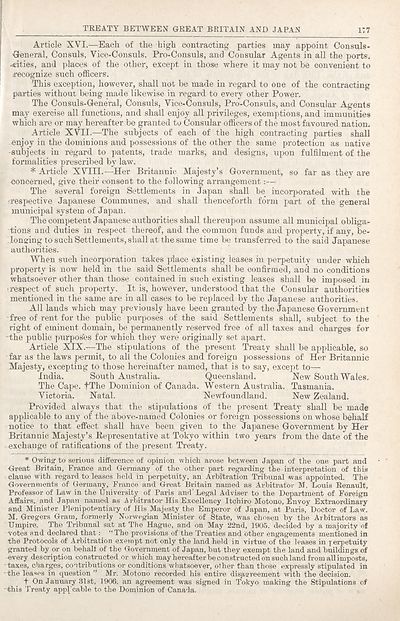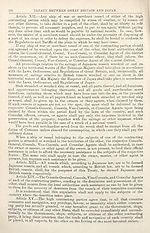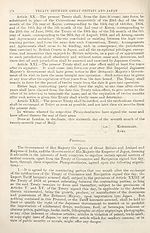1918
(245) Page 177
Download files
Complete book:
Individual page:
Thumbnail gallery: Grid view | List view

TREATY BETWEEN GREAT BRITAIN AND JAPAN
177
Article XVI.—Each of the high contracting parties may appoint Consuls-
'G-eneral, Consuls, Vice-Consuls. Pro-Consuls, and Consular Agents in all the ports,
•cities, and places of the other, except in those where it may not be convenient to
recognize such officers.
This exception, however, shall not be mad.e in regard to one of the contracting
parties without being made likewise in regard to every other Power.
The Consuls-Greneral, Consuls, Vice-Consuls, Pro-Consuls, and Consular Agents
may exercise all functions, and shall enjoy all privileges, exemptions, and immunities
which are or may hereafter be granted to Consular officers of the most favoured nation.
Article XVII.—The subjects of each of the high contracting parties shall
enjoy in the dominions and possessions of the other the same protection as native
-subjects in regard to patents, trade marks, and designs, upon fulfilment of the
formalities prescribed by law.
* Article XVIII.—Her Britannic Majesty’s Government, so far as they are
concerned, give their consent to the following arrangement:—
The several foreign Settlements in Japan shall be incorporated with the
■respective Japanese Communes, and shall thenceforth form part of the general
municipal system of Japan.
The competent Japanese authorities shall thereupon assume all municipal obliga¬
tions and duties in respect thereof, and the common funds and property, if any, be-
; longing to such Settlements, shall at the same time be transferred to the said Japanese
authorities.
When such incorporation takes place existing leases in perpetuity under which
property is now held in the said Settlements shall be confirmed, and no conditions
whatsoever other than those contained in such existing leases shall be imposed in
* respect of such property. It is, however, understood that the Consular authorities
mentioned in the same are in all cases to be replaced by the Japanese authorities.
All lands which may previously have been granted by the Japanese Government
free of rent for the public purposes of the said Settlements shall, subject to the
right of eminent domain, be permanently reserved free of all taxes and charges for
the public purposes for which they were originally set apart.
Article XIX.—The stipulations of the present Treaty shall be applicable, so
-far as the laws permit, to all the Colonies and foreign possessions of Her Britannic
Majesty, excepting to those hereinafter named, that is to say, except to—
India. South Australia. Queensland. New South Wales.
The Cape. fThe Dominion of Canada. Western Australia. Tasmania.
Victoria. Natal. Newfoundland. New Zealand.
Provided always that the stipulations of the present Treaty shall be made
applicable to any of the above-named Colonies or foreign possessions on whose behalf
notice to that effect shall have been given to the Japanese Government by Her
Britannic Majesty’s Representative at Tokyo within two years from the date of the
exchange of ratifications of the present Treaty.
* Owing to serious difference of opinion which arose between Japan of the one part and
Great Britain, France and Germany of the other part regarding the interpretation of this
clause with regard to leases held in perpetuity, an Arbitration Tribunal was appointed. The
Governments of Germany, France and Great Britain named as Arbitrator M. Louis Renault,
Professor of Law in the IJniversity of Paris and'Legal Adviser to the Department of Foreign
Affairs, and Japan named as Arbitrator His Excellency Itohiro Motono, Envoy Extraordinary
and Minister Plenipotentiary of His Majesty the Emperor of Japan, at Paris, Doctor of Law.
M. Gregers Gram, formerly Norwegian Minister of State, was chosen by the Arbitrators as
Umpire. The Tribunal sat at The Hague, and on May 22nd, 1905. decided by a majority of
votes and declared that: “The provisions of the Treaties and other engagements mentioned in
the Protocols of Arbitration exempt not only the land held in virtue of the leases in perpetuity
granted by or on behalf of the Government of Japan, but they exempt the land and buildings of
every description constructed or which may hereafter be constructed on such land from all imposts,
taxes, charges, contributions or conditions whatsoever, other than those expressly stipulated in
the leases in question ” Mr. Motono recorded his entire disagreement with the decision.
t On January 31st, 1906. an agreement was signed in Tokyo making the Stipulations of
this Treaty appl cable to the Dominion of CanaJa.
177
Article XVI.—Each of the high contracting parties may appoint Consuls-
'G-eneral, Consuls, Vice-Consuls. Pro-Consuls, and Consular Agents in all the ports,
•cities, and places of the other, except in those where it may not be convenient to
recognize such officers.
This exception, however, shall not be mad.e in regard to one of the contracting
parties without being made likewise in regard to every other Power.
The Consuls-Greneral, Consuls, Vice-Consuls, Pro-Consuls, and Consular Agents
may exercise all functions, and shall enjoy all privileges, exemptions, and immunities
which are or may hereafter be granted to Consular officers of the most favoured nation.
Article XVII.—The subjects of each of the high contracting parties shall
enjoy in the dominions and possessions of the other the same protection as native
-subjects in regard to patents, trade marks, and designs, upon fulfilment of the
formalities prescribed by law.
* Article XVIII.—Her Britannic Majesty’s Government, so far as they are
concerned, give their consent to the following arrangement:—
The several foreign Settlements in Japan shall be incorporated with the
■respective Japanese Communes, and shall thenceforth form part of the general
municipal system of Japan.
The competent Japanese authorities shall thereupon assume all municipal obliga¬
tions and duties in respect thereof, and the common funds and property, if any, be-
; longing to such Settlements, shall at the same time be transferred to the said Japanese
authorities.
When such incorporation takes place existing leases in perpetuity under which
property is now held in the said Settlements shall be confirmed, and no conditions
whatsoever other than those contained in such existing leases shall be imposed in
* respect of such property. It is, however, understood that the Consular authorities
mentioned in the same are in all cases to be replaced by the Japanese authorities.
All lands which may previously have been granted by the Japanese Government
free of rent for the public purposes of the said Settlements shall, subject to the
right of eminent domain, be permanently reserved free of all taxes and charges for
the public purposes for which they were originally set apart.
Article XIX.—The stipulations of the present Treaty shall be applicable, so
-far as the laws permit, to all the Colonies and foreign possessions of Her Britannic
Majesty, excepting to those hereinafter named, that is to say, except to—
India. South Australia. Queensland. New South Wales.
The Cape. fThe Dominion of Canada. Western Australia. Tasmania.
Victoria. Natal. Newfoundland. New Zealand.
Provided always that the stipulations of the present Treaty shall be made
applicable to any of the above-named Colonies or foreign possessions on whose behalf
notice to that effect shall have been given to the Japanese Government by Her
Britannic Majesty’s Representative at Tokyo within two years from the date of the
exchange of ratifications of the present Treaty.
* Owing to serious difference of opinion which arose between Japan of the one part and
Great Britain, France and Germany of the other part regarding the interpretation of this
clause with regard to leases held in perpetuity, an Arbitration Tribunal was appointed. The
Governments of Germany, France and Great Britain named as Arbitrator M. Louis Renault,
Professor of Law in the IJniversity of Paris and'Legal Adviser to the Department of Foreign
Affairs, and Japan named as Arbitrator His Excellency Itohiro Motono, Envoy Extraordinary
and Minister Plenipotentiary of His Majesty the Emperor of Japan, at Paris, Doctor of Law.
M. Gregers Gram, formerly Norwegian Minister of State, was chosen by the Arbitrators as
Umpire. The Tribunal sat at The Hague, and on May 22nd, 1905. decided by a majority of
votes and declared that: “The provisions of the Treaties and other engagements mentioned in
the Protocols of Arbitration exempt not only the land held in virtue of the leases in perpetuity
granted by or on behalf of the Government of Japan, but they exempt the land and buildings of
every description constructed or which may hereafter be constructed on such land from all imposts,
taxes, charges, contributions or conditions whatsoever, other than those expressly stipulated in
the leases in question ” Mr. Motono recorded his entire disagreement with the decision.
t On January 31st, 1906. an agreement was signed in Tokyo making the Stipulations of
this Treaty appl cable to the Dominion of CanaJa.
Set display mode to:
![]() Universal Viewer |
Universal Viewer | ![]() Mirador |
Large image | Transcription
Mirador |
Large image | Transcription
Images and transcriptions on this page, including medium image downloads, may be used under the Creative Commons Attribution 4.0 International Licence unless otherwise stated. ![]()
| Asian directories and chronicles > 1918 > (245) Page 177 |
|---|
| Permanent URL | https://digital.nls.uk/194896515 |
|---|
| Attribution and copyright: |
|
|---|---|
| Description | Volumes from the Asian 'Directory and Chronicle' series covering 1917-1941, but missing 1919 and 1923. Compiled annually from a multiplicity of local sources and research. They provide listings of each country's active corporations, foreign residents and government agencies of all nationalities for that year, together with their addresses. Content includes: various treaties; coverage of conflicts; currencies and taxes; consular fees; weights and measures; public holidays; festivals and traditions. A source of information for both Western states and communities of foreigners living in Asia. Published by Hongkong Daily Press. |
|---|---|
| Shelfmark | H3.86.1303 |
| Additional NLS resources: |

